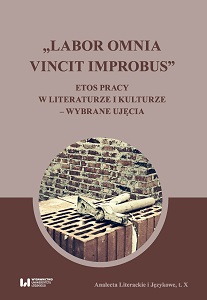Praca w literaturze od antyku po koniec XVII wieku — wybrane ujęcia
Work in Literature from Antiquity to the End of the 17th Century — Selected Approaches
Author(s): Michał Kuran
Subject(s): Language and Literature Studies, Studies of Literature
Published by: Wydawnictwo Uniwersytetu Łódzkiego
Keywords: work of a slave;work of a landowner;rafter’s work;work of a sailor;miner’s work;creative work
Summary/Abstract: The purpose of the study is to capture the richness of work forms described in literature from antiquity to the end of the 17th century. The dominant feature is the presentation of a work image in selected Old Polish works. Significant for the deliberations is the division verbalized by Sebastian Fabian Klonowic, who, following the ancient authorities, defined what activities can the nobility deal with and which of them did not belong to its state ethos. The study was divided into three parts. The first presents selected works constituting the state of researches on the issue. Second part presents chosen examples of descriptions and opinions about the topic of work derived from the Bible, mythology and the Classical Literature (especially works od Hesiod, Virgil and Horace). Third part brings closer the images of work portrayed in Polish literature of the Renaissance and the Baroque. Especially there are works connected with a life of nobleman-landowner (landlord), diplomat, peasant and shepherd, slave, soldier, rafter, sailor, miner, steelworker as well as a writer. The study brings closer also chosen examples of theoretical considerations about the topic of work by mainly Renaissance thinkers. The topic of work is present in the Old Polish writings representing various literary forms, as well as literary genres, were created often under the influence of the authority of the ancient literature. Writers once show strict division of performers and activities motivated by their state affiliation, elsewhere the cooperation of the representatives of various states in a realization of common objective. The study also perceives the work of a slave functioning in the Osman Empire in conjunction with the position and difficulty of the serf peasant.
Book: „Labor omnia vincit improbus”. Etos pracy w literaturze i kulturze – wybrane ujęcia
- Page Range: 63-97
- Page Count: 35
- Publication Year: 2019
- Language: Polish
- Content File-PDF

